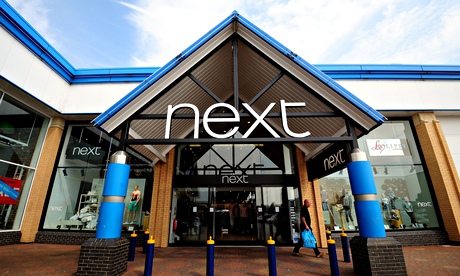Next’s profits set to overtake Marks & Spencer after 12% annual rise

The decline of Marks & Spencer was again brutally underlined on Thursday when Next reported soaring profits that are almost certain to have beaten its venerable high street rival for the first time.
After bets on “braver” fashion and homewares paid off, Next said annual profits were up 12% to £695m – just a day after M&S’s house brokers cut profit forecasts for the 130-year-old retailer to about £615m. “The year to January 2014 was a great year for Next,” said its chairman, John Barton.
It also came only two weeks after M&S lost its crown as middle England’s favourite shopping destination to John Lewis, with £9bn of UK sales at the Waitrose owner overtaking the latest available figures for M&S.
Next, long regarded as M&S’s “little sister”, had already overtaken its rival in stock-market value two years ago, despite having fewer stores and much lower sales. But M&S, which is due to report on fourth-quarter trading on 10 April and will publish its annual results in May, has seen clothing sales fall back as it struggles to attract younger shoppers.
As he presented the retailer’s stellar results, Next’s usually cautious chief executive, Lord Wolfson, gave one of his most upbeat verdicts on the economy for years, suggesting consumers could finally begin to feel they had more cash in their pockets.
“In the last three or four years the gap between earnings growth and inflation has narrowed so that now they are almost kissing. Potentially we are at a tipping point,” he said.
With that potential for a more “benign environment”, Wolfson, who started as a sales consultant at Next when his father was chairman, predicted the group would see sales rise by up to 8%, his most optimistic expectation in five years.
But he warned: “We are not exuberant – and that’s sensible because there are still risks to the economy, not least that at some point interest rates will go up, and if that happens it could knock the wind out of any recovery.”
Wolfson said a 1% rise in interest rates could increase costs for consumers by between £7bn and £10bn, and he admitted that Next was more likely than some other retailers to see a “significant impact” because its 25- to 45-year-old customers were more likely to have high mortgages.
Tony Shiret, a retail analyst at Espirito Santo, agreed: “We think that investors should now consider becoming more cautious here … Next is the clothing retailer most exposed to customers with mortgages.”
However, Next’s shares rose 2.3% to £67.30 as it revealed that sales climbed 5.4% to £3.7bn in the year to January, with catalogue and online sales up 12.4% while retail sales from stores grew by 1.7%. Profits from the catalogue and website rose by nearly 19% to £358.5m, the first time they have exceeded profits from stores.
The chain has increased shop floor space to 650,000sq metres, up 4%, while the number of stores has barely changed.
Homewares took up the lion’s share of new space, helping Next benefit from the improving housing market and increasing sales from the category to 18% of total turnover. The group will continue to expand that area with a third of the 33,500sq metres of space planned to open this year accounted for by three big department-style stores that will have homewares and garden centres, in York, Maidstone in Kent, and Hedge End in Hampshire.
Next hailed its fashion team for having been “braver in buying into new trends” and making efforts to alter ranges to reflect a growing trend for consumers to buy closer to the time at which they need the clothing.
The group, which has 541 UK stores, has adjusted its buying – moving to a four-season from a two-season cycle – because consumers now tend to leave it to the last minute before they buy winter or summer clothes.
As a result it is boosting the availability of cold-weather clothing in January, February and March and warm-weather clothing in August and September.
Other plans include a trial of a new website and catalogue, Label, selling well-known brands such as Converse and Calvin Klein. Wolfson said the catalogue had gone out to 400,000 homes and could be an opportunity to attract new labels that did not want to appear within the Next catalogue. He said there was unlikely to be any further news on any expansion until September next year.
Next also delighted shareholders with the news it would pay a further special dividend of 50p in May, repeating the payout in February. The company said it had stopped buying back its shares in October because of its rising share price, instead opting to return cash to shareholders through special dividends.
(By Sarah Butler and Julia Kollewe)
Source: theguardian



























